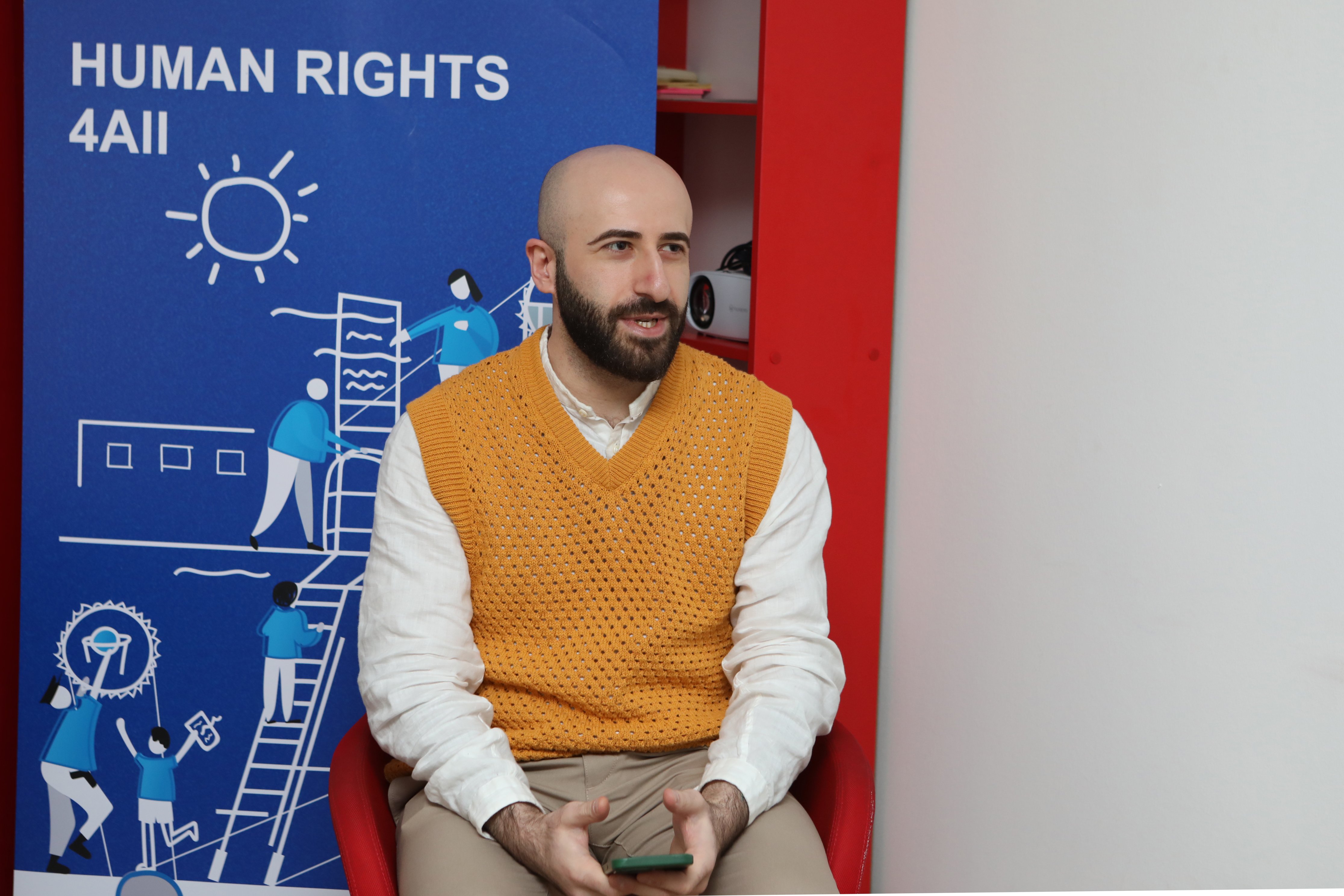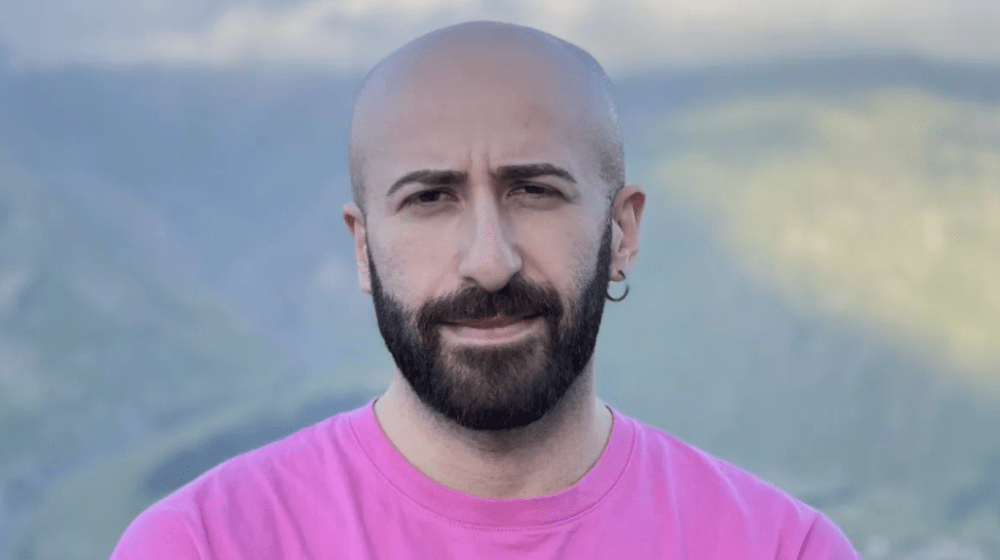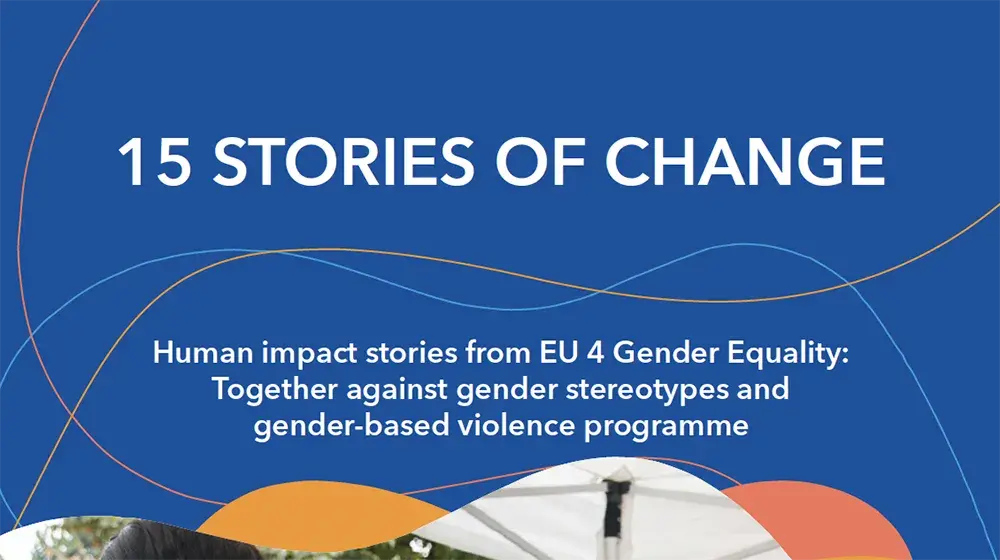TBILISI, Georgia – When Beka Gabadadze started working as a social worker in Georgia’s LGBTQIA+ community, he quickly discovered how a person’s gender identity and expression can affect every part of their life. “When you are doing outreach and meeting a lot of people on the ground, you know more about what kind of needs your community has,” he explained. “It was not just health care needs, but there were housing issues, employment, a lot of violence and other things.”
Mr. Gabadadze is the chairperson of Temida, a community organization focused on advocating for transgender rights. But he began his career in 2013 with the Center for Information and Counseling on Reproductive Health (Tanadgoma), a UNFPA partner in Georgia. Their aim was to raise awareness about sexual and reproductive health among LGBTQIA+ members and increase usage of HIV testing and prevention services
Georgia is considered a low HIV and AIDS prevalence country, with 0.3 per cent of the general adult population estimated to be living with the virus, according to the 2023 UNAIDS data report. However, the HIV prevalence rate is significantly higher among men having sex with men. It rose from 7 per cent in 2010 to a high of 25.1 per cent in 2015, one of the highest levels in the Eastern Europe and Central Asia region at the time.
UNFPA is committed to HIV prevention based on the principle of “Leaving No One Behind,” which seeks to address stigma and discrimination against groups who have been disempowered and excluded due to factors like sexual orientation and gender expression.
Tanadgoma has helped to put this principle into practice as a UNFPA strategic partner. Mr. Gabadadze and his colleagues organized referrals to HIV and STI clinics and hosted events to educate LGBTQIA+ people on their sexual and reproductive health and rights. A number of queer community centres were also set up in the country’s three largest cities - Tbilisi, Batumi and Kutaisi - as well as smaller towns like Zugdidi and Telavi.
Advocacy by UNFPA, Tanadgoma and other local partners also led to advances at the Government level. Georgia has made it a priority to prevent new HIV infections among key populations and their sexual partners, including those in the LGBTQIA+ community, and provides HIV testing services free of charge for everyone. In 2017, Georgia also became the first country in the Eastern Europe and Central Asia region to roll out pre-exposure prophylaxis (PrEP) among men who have sex with men and transgender people.
Innovative responses to continuing challenges
While LGBTQIA+ and HIV prevention programmes have expanded, there remain challenges to how they are received. Fears about openly identifying as queer prevent many from attending information sessions or seeking HIV testing and treatment. “I am not a public health specialist, but I can clearly say that the stigma that is around sexuality and gender identities is helping to increase HIV prevalence,” said Mr. Gabadadze. He added that the community centres in Zugdidi and Telavi were eventually shut down due to backlash from locals and the high costs of maintaining services in those more remote locations.
But new initiatives have emerged in their place. For example, a joint project by UNFPA and UNDP, with Tanadgoma as an implementing partner, created a platform where people can place orders online – and anonymously – to receive free sexual health kits. The packages include rapid HIV tests, condoms, lubricants and guides about STI prevention and sexual and reproductive health services. “We are somehow adapting our resources and new technologies together to match the needs of the community,” Mr. Gabadadze said.

The latest Integrated Bio-Behavioral Surveillance Survey (IBBSS) report for Georgia suggests these various efforts over the years have paid off. Target groups in Georgia’s largest cities showed significant improvements in HIV knowledge. In 2010, less than a fifth of the people surveyed in Tbilisi were found to have adequate information about the virus. By 2018, that level nearly doubled to 37 per cent. Batumi and Kutaisi recorded even higher scores, with 41 and 42 per cent, respectively, possessing a good understanding of HIV. The IBBSS report also showed that the number of men who have sex with men in Tbilisi who had been tested and knew their HIV status had jumped from 14 per cent in 2015 to more than 54 per cent in 2018.
Sexual reproductive health rights for all
In 2019, Mr. Gabadadze turned his attention to serving the needs of transgender people by joining Temida, which is also supported by UNFPA. The stories he heard from that community shocked him: “They were kicked out from their family, which limited the possibility in many cities to even use public transportation because they might get bullied or something.”
Gender-affirming care is legal in Georgia, but Mr. Gabadadze emphasized that equal access to adequate health care for transgender people still lags. He recalled that when he first started at Temida, there was only one endocrinologist in all of Georgia – a country of more than 3.7 million people – who was providing hormone therapy. The price of treatment was also very high and not covered by any insurance, leaving it out of reach for most people.
Even those who could afford the procedures had to deal with doctors who were unfamiliar with how to care for and communicate with transgender patients. Mr. Gabadadze and his team began holding workshops with health-care workers to train them on the community’s needs, language sensitivity and fighting stigmas and prejudices. He also recently helped to translate the latest version of Standards of Care published by the World Professional Association for Transgender Health in an effort to set treatment guidelines and protocols that do not yet legally exist in Georgia. “And since the situation from 2019, a little bit has changed because there are at least right now three clinics that are providing care,” he said. “And also, when there was one doctor, the prices were quite high. But right now that is starting to come down.
Protecting fragile progress
The successes Mr. Gabadadze has seen in the LGBTQIA+ community over the past decade of activism have given him great pride and hope. But he knows the work is not done – and can be undone.

UNDP/Nino Zedginidze
Homophobia and transphobia remain present in public attitudes. An opinion poll conducted in 2021 found that more than 60 per cent of respondents still opposed same-sex marriage and the right of LGBTQIA+ people to adopt children. The Georgian parliament is also currently considering a draft bill that would ban non-heterosexual marriages and legal or surgical sex changes, while also curbing public gatherings that promote “same-sex family or intimate relationships.”
The United Nations office in Georgia released a statement on the International Day against Homophobia, Biphobia and Transphobia urging human rights to be safeguarded for everyone: “We stand ready to continue working alongside Georgian partners to align state policies and practices with the fundamental human rights values enshrined in the Constitution of Georgia and underscored by the country’s international commitments.”
Services like those offered by Tanadgoma and Temida rely largely on funding from international donors like UNFPA and government assent. Mr. Gabadadze worries that if either decreases, the queer community, especially its most vulnerable members, will be forced to go back underground, where there has already been a reported increase in dubious new hormones and treatments appearing.
Mr. Gabadadze believes that LGBTQIA+ people in Georgia have learned many lessons over the years. He urged them to call on this strength and experience to meet the challenges that lie ahead. “I ask my community to stay prepared,” he said. “We will have to work differently, absolutely, but the resilience is still there.”




